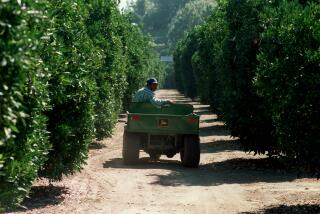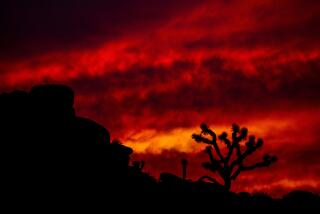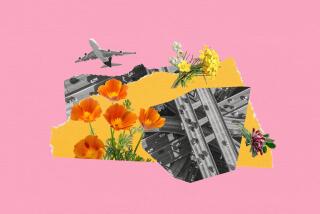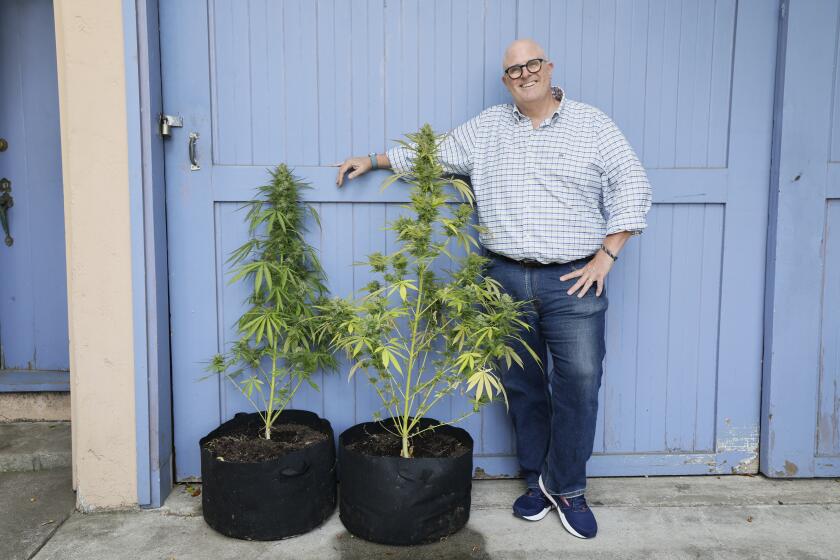Despite mess, jacarandas are purple people pleasers
The drive down Pasadena’s Del Mar Boulevard under a canopy of ultraviolet-blue jacarandas has lost none of its effect on Roland Clements after all these years.
Clements first saw the blooming trees that gracefully line the boulevard in 1984 when he moved here from central Florida. He dreamed then of making his home on the postcard-perfect roadway.
Five years ago, the real estate agent moved into a restored Craftsman with an inviting front porch.
“Every morning when I step out of my house, it’s like a Matisse painting,” he said, the vibrant petals, to his eye, like the impressionistic brush strokes of the French master.
About 3,500 jacarandas dot Pasadena, with one rare, white-flowered exception flourishing near Del Mar and South Lake Avenue, said Kenneth Graham, the city’s forester.
The trees bloom for two months twice a year, once around April to May and again around November to December.
Although there are 49 species of the tree, the Jacaranda mimosifolia is the most popular locally because it thrives in sunny, tropically tinged weather with little rain, said David Lofgren, a horticulturist with the Los Angeles County Arboretum in Arcadia.
He said Southern California’s variety -- nicknamed blue jacarandas -- are actually slightly less blue than those in the trees’ native Argentina, Bolivia and Brazil.
Trees grown from seeds first imported to California had a violet tint that has been widely propagated in the region over the decades, Lofgren said.
It’s that distinctive color atop the trees, which can reach 60 feet high, that charms onlookers.
“Blue is a very difficult color to achieve in botany,” he said. “They don’t serve more than for the purpose of eye candy, but we as humans are inherently drawn to color. Why is it that we pay more for a color TV than for one that’s black and white?”
The trees’ vibrancy can be a selling point.
On a listing for a $582,000 tri-level condo overlooking Del Mar Boulevard, Realtor Teri Barton wrote: “The living room is accented with a tiled, mantled fireplace overlooking the jacaranda trees.”
Details like that, Barton said, help set the person visually in the place and remind them “that there are still green places in Los Angeles. And I think it’s just a pleasant thing to look at.”
But those who have lived among the jacarandas know such beauty can be messy.
The trees infamously shed their flowers, frequently sprinkling down into manicured gardens and onto sidewalks, frustrating property owners and gardeners.
It’s a great tree, goes the line, in a neighbor’s yard.
On her daily morning walk down Del Mar to Trader Joe’s to get groceries, 96-year-old Maria Getty -- who said that when she first moved to Pasadena 40 years ago she could rent a one-bedroom for $100 -- admitted a longtime love of the trees.
“I’m just glad they don’t grow in front of my apartment so I don’t have to sweep every day,” she added with a laugh.
A few blocks away at McKinley School, custodian Raul Venegas, 37, had no such luck. In jacaranda season, he said, he has double the work, sweeping and using a leaf blower twice a week to clear the campus.
And if smashed, the liquid inside the pods emits a sticky substance -- aphid waste in the bloom, not sap -- which can cause slippery pavement. Bug remover can usually get rid of stickiness once the sun bakes it onto cars, sidewalks or even the soles of shoes, Lofgren said.
The juicy flower has made the jacaranda controversial at times. In 2004, Garden Grove officials put restrictions on planting them near a planned senior citizens’ housing development, saying the blossoms cause conditions that could endanger elderly residents.
In 2000, more than two dozen jacarandas were ordered chopped down in Yorba Linda after residents complained that the flowers littered patios and clogged spa filters.
Even Clements is not immune to the negatives.
“I find the flowers in my house mixed with golden retriever hair,” he said, standing in his doorway as he sipped a coffee on a chilly morning recently. “And they fall kind of loudly at night, startling me sometimes.”
The price, he said, is small.
“I feel really blessed to have the trees,” Clements said. “They give the area some magicalness, and you can just see the life within them.”
--
francisco.varaorta @latimes.com






